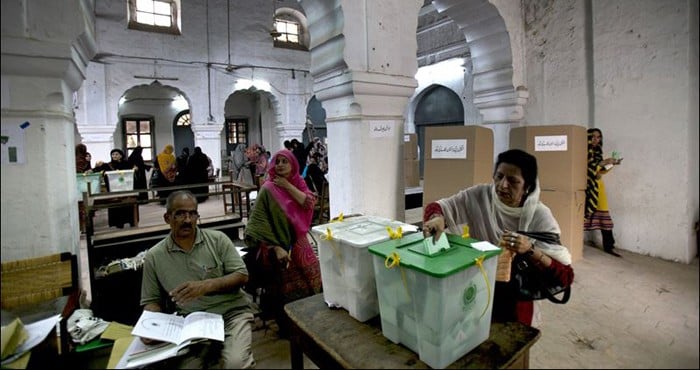
The PML-N makes a clean sweep in the Gilgit-Balistan Legislative Assembly elections last week

The Pakistan Muslim League-Nawaz (PML-N), as expected, has emerged as a winning political party in the recent elections in Gilgit-Balistan Legislative Assembly (GBLA), held on June 8.
According to unofficial results, out of a total 24 elected seats in seven districts of the region, the PML-N has won 14 seats, while the PPP secured only one seat. Allama Sajid Naqvi-led Islami Tehreek Pakistan (ITP) and the Majlis-e-Wahdatul Muslimeen (MWM) have won two seats each. The Jamiat-e-Ulema-e-Islam-Fazl (JUI-F) has secured one seat. The Pakistan Tehreek-e-Insaf (PTI) has also won one seat, while lost another one with a margin of one vote in re-counting.
One seat is disputed between the PML-N and the JUI-F, and re-counting has been ordered.
A leader of Balawaristan National Front and an independent candidate had also secured one seat each.
The Muttahida Qaumi Movement, Pervez Musharraf’s All Pakistan Muslim League, the Jamaat-e-Islami, the Ahl-e-Sunnat Wal Jamaat, the Sunni Ittehad Council and the Awami Workers Party also fielded candidates but could not win.
The elections were held peacefully all over the region under the supervision of the army. The Human Rights Commission of Pakistan has praised the conduct of peaceful and largely orderly polls for the GBLA and observed that other regions of Pakistan could do well to emulate GB polls.
In a 33-member assembly, the PML-N is in a position to form the government alone, as the party will get six reserved seats -- four out of six reserved seats for women and two out of three for technocrats -- and one independent candidate is likely to join the PML-N.
Hafeezur Rehman is the strongest candidate for the chief minister’s slot but local analysts say Muhammad Akbar Tabar, who defeated PPP’s former chief minister Syed Mehdi Shah, Fida Muhammad Nashad, Mir Ghazanfar and Janbaz Khan are also in the race for the slot. Insiders in the PML-N say the party is thinking of inviting the ITP and JUI-F to form the government -- to maintain sectarian harmony in the region.
The PPP, along with the PTI and MWM will be in opposition in GBLA.
The PML-N has traditionally been weak in Gilgit-Baltistan, but this time, the party has outperformed political rivals. Except the 1999 polls in then Northern Areas Legislative Council, the party won six seats and formed government with the then Naqvi-led Tehreek-e-Jaffaria Pakistan.
Analysts believe the PML-N’s regional president Hafiz Hafeezur Rehman not only ran the party’s electoral campaign in a well-organised manner but also exploited the notion that only the party in power in Islamabad can develop GB.
Muhammad Shafiq, a PML-N leader elected from Ghance, says the PPP had kept GB in the dark, and victory of the PML-N is a beginning of an era of development in the region.
The PPP has traditionally enjoyed support in the region, especially since Zulfikar Ali Bhutto abolished the Frontier Crime Regulation and introduced administrative reforms in 1970s. However, local analysts believe that bad governance and intra-party fissures are key reasons behind the party’s worst defeat in the polls. "Chief Minister Mehdi Shah and all former ministers have been defeated in the elections and only one candidate has won the seat from Shigar," says Abdul Jabbar Nasir, a veteran journalist who monitored GBLA votes closely.
"Ziaul Haq could not succeed in weakening the PPP in the region during his 11 years of dictatorship but the current leadership has ruined itself in five years," says a PPP leader in Hunza.
However, the PPP insiders and political analysts blame their local leaders of using the ‘sectarian card’ to get support from the Shia majority region. Nasir says the controversial speeches during the electoral rallies made by leaders like Shehla Raza, PPP leader and Sindh Assembly’s deputy speaker, Faisal Raza Abidi, PPP’s former leader, and Sahibzada Hamid Raza, head of Sunni Ittehad Council, helped the PML-N to defeat the PPP.
The MWM and ITP withdrew some of its candidates in favour of the PPP in mixed-populated constituencies but both groups contested polls in the Shia majority areas against each other. "It basically spoiled the liberal colour of the party," says a PPP leader in Hunza. "Also, it compelled the Sunni candidates to withdraw in favour of the PML-N in the Sunni-majority areas," he adds.
The PPP leaders like Qamar Zaman Kaira visited the region and tried to control his party’s losing popularity among the voters by calling key leaders of Sunni community, but it did not work.
Shehla Raza accused the PML-N of forming secret alliances with sect-based groups and used the MWM to split the PPP vote bank in the region. "The PML-N spoiled the PPP’s efforts to maintain sectarian harmony in the region by using the MWM," she said at a press conference in Gilgit on June 10.
Before the polls, political analysts were expecting the PTI to emerge as a new powerful player in the GB politics, by securing more than six seats. But election results were quite the opposite.
"Imran Khan announced to contest the GBLA polls but did not complete its organisational setup in the region, and also did not visit GB before the submission of nomination papers," says a report in daily K2, a local newspaper.
Also, in his gathering in Skardu, Khan, instead of discussing the woes of the GB residents, such as their constitutional rights and student quota in universities and colleges of Khyber Pakhtunkhwa, talked about rigging in the constituencies of Lahore, the report maintained.